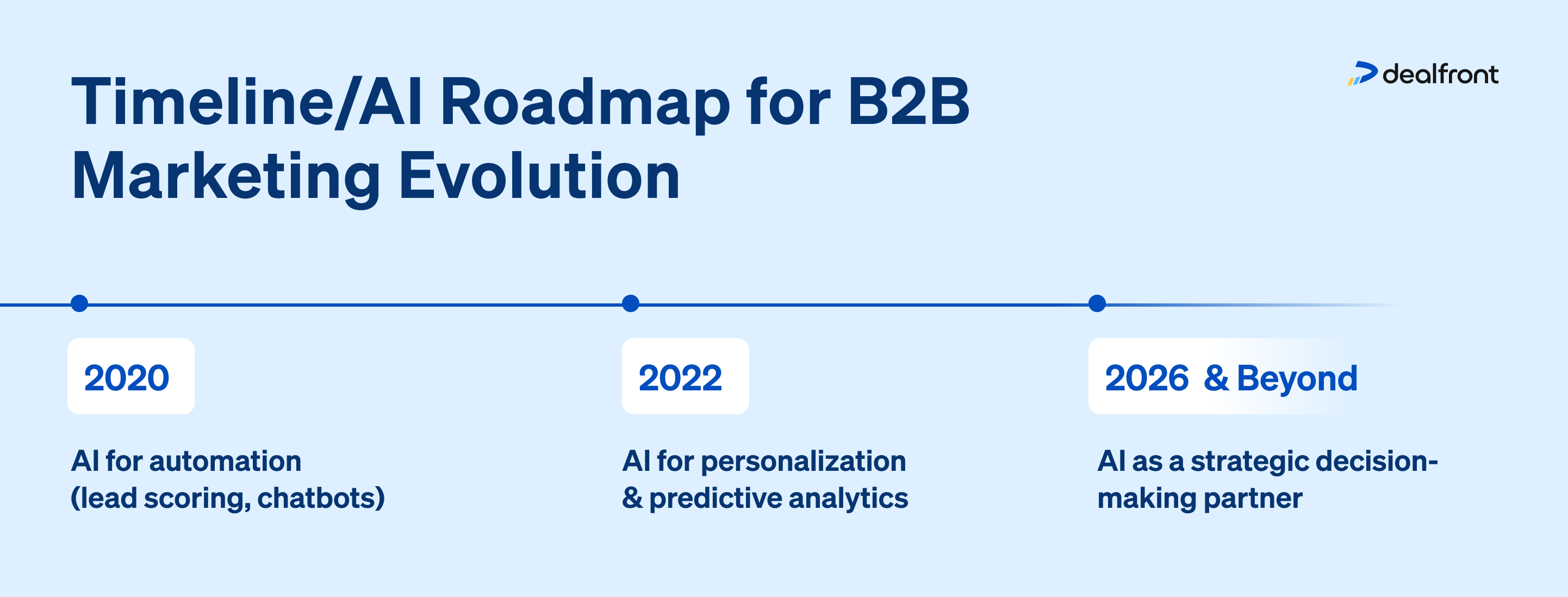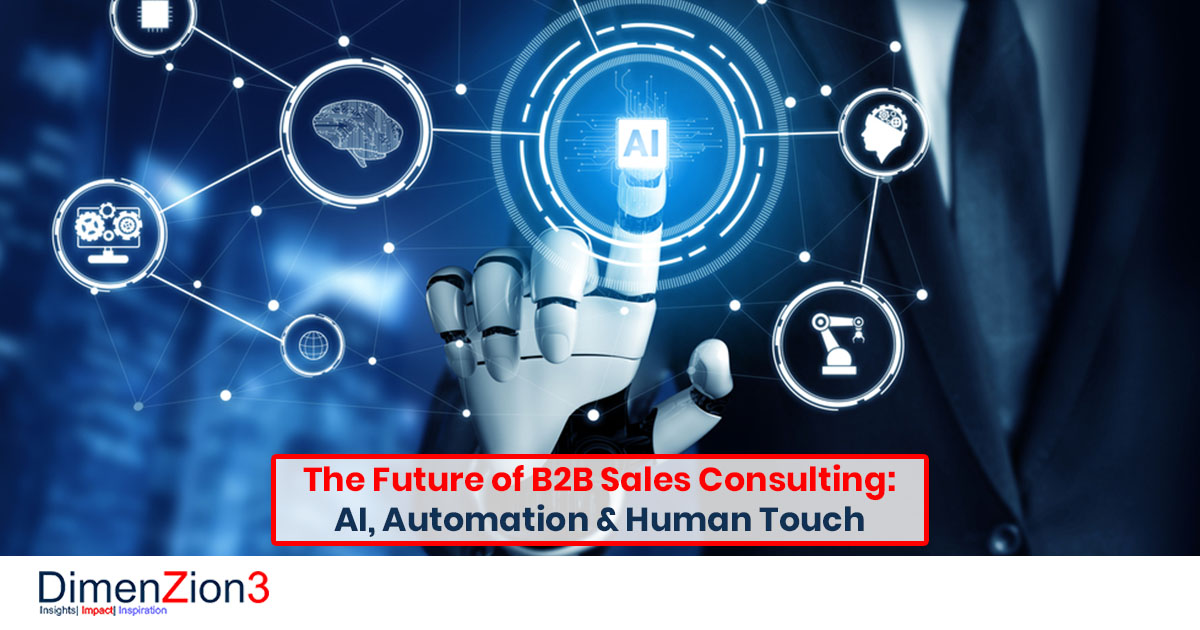How Growth Systems For B2B supports data-driven decision-making
Revolutionize Your Organization: How AI Automation Is Transforming B2B Procedures
AI automation is improving B2B procedures in considerable means. Companies are adopting this technology to streamline process and improve effectiveness. As tasks end up being automated, organizations can focus on critical development instead than ordinary procedures. The ramifications of these modifications are profound, influencing whatever from customer interactions to provide chain management. Recognizing this improvement is necessary, as the future of business rest on the efficient integration of AI into everyday procedures. What exists in advance in this advancing landscape?
Understanding AI Automation in B2B Context
As services increasingly look for effectiveness, recognizing AI automation within the B2B context ends up being important. AI automation describes the application of expert system technologies to simplify and enhance service processes. In B2B environments, this can manifest in numerous types, such as automating information entrance, enhancing supply chain logistics, or improving inventory management. Organizations leveraging AI automation can minimize functional costs, lessen human mistake, and increase performance. In addition, AI tools can analyze substantial quantities of information to give actionable insights, enabling educated decision-making. The integration of AI into B2B procedures not just changes traditional operations yet also promotes dexterity and scalability, permitting businesses to adapt to market adjustments swiftly and effectively. Accepting this technology is essential for staying competitive in today's digital landscape.
Enhancing Customer Experience Via AI
How can AI change consumer communications in the B2B field? AI boosts customer experience by supplying customized, timely, and effective solution. Smart chatbots and digital aides can deal with queries 24/7, making certain clients receive prompt actions. Anticipating analytics make it possible for organizations to anticipate consumer requirements, customizing offerings as necessary. AI-driven systems can examine client data, permitting targeted marketing methods and enhanced engagement. In addition, sentiment evaluation tools examine customer feedback, aiding organizations tweak their solutions. By automating routine tasks, AI frees up human sources to concentrate on high-value interactions, cultivating more powerful relationships. The combination of AI not just streamlines interaction yet also builds count on and commitment, inevitably boosting the overall client experience in the affordable B2B landscape.
Improving Supply Chain Administration With AI
AI plays a necessary role in maximizing supply chain management through anticipating analytics and automated supply control (Growth Systems For B2B). By leveraging predictive analytics, companies can expect need variations and adjust their procedures accordingly. Automated stock systems better improve performance by guaranteeing supply degrees are maintained, minimizing waste and boosting total performance

Predictive Analytics Advantages
While many services deal with challenges in handling complicated supply chains, anticipating analytics supplies a transformative service by leveraging huge amounts of information to anticipate fads and maximize procedures. By assessing historic data along with real-time inputs, predictive analytics enables business to determine patterns and anticipate future demands. This foresight permits even more informed decision-making, boosting efficiency and minimizing prices. Additionally, companies can proactively attend to potential disturbances by forecasting supply chain traffic jams and readjusting approaches as necessary. The assimilation of anticipating analytics not only enhances stock administration however likewise promotes stronger relationships with distributors and consumers via prompt feedbacks to market shifts. Eventually, the adoption of predictive analytics encourages companies to remain competitive in a progressively vibrant company atmosphere.
Automated Inventory Control
As businesses significantly count on anticipating analytics to enhance supply chain operations, automated inventory control becomes a powerful ally in this initiative. By leveraging AI-driven innovations, business can enhance precision in stock tracking, lower stockouts, and lessen excess stock. Automated systems analyze real-time data, allowing businesses to predict need variations and readjust stock degrees appropriately. This not only simplifies order gratification however additionally improves cash circulation administration by reducing holding prices. Furthermore, AI can identify patterns in buying actions, allowing even more educated decision-making concerning vendor relationships and purchase strategies. Inevitably, automated inventory control not just boosts functional performance however additionally enhances client contentment by making sure product accessibility, strengthening its role as a crucial component in contemporary supply chain administration.
Data-Driven Decision Making Powered by AI
In today's competitive landscape, companies significantly depend on data-driven decision-making to enhance operational effectiveness and critical planning. Man-made knowledge plays a crucial role in this transformation by evaluating vast amounts of data promptly and properly. AI algorithms recognize patterns, fads, and anomalies that human analysts could overlook, enabling companies to make educated decisions based on real-time insights - Minarik AI. This capability permits firms to predict market changes, maximize source allotment, and tailor their offerings to consumer demands. Additionally, AI-driven analytics help with risk assessment and administration, making certain that organizations can navigate uncertainties successfully. By leveraging these innovative devices, companies not only enhance their decision-making procedures however additionally gain a competitive advantage in their particular markets, cultivating development and innovation
Automating Repetitive Tasks to Increase Efficiency
Enhancing recurring jobs via automation greatly enhances productivity within B2B procedures. By implementing AI-driven remedies, firms can get rid of ordinary activities such as data entrance, invoice processing, and record generation. This shift allows employees to concentrate on higher-value jobs, fostering creativity and strategic reasoning. Automating these time-consuming processes not just lowers human mistake yet additionally speeds up process efficiency. Furthermore, companies can achieve regular outcomes and boosted accuracy, which is vital in preserving customer satisfaction. The assimilation of automation devices allows organizations to allocate sources better, guaranteeing that teams can react quickly to market needs. Inevitably, embracing AI for repetitive jobs is a tactical move that changes operational capacities and drives general company development.
Integrating AI With Existing Organization Processes
Numerous companies deal with obstacles when incorporating AI with existing service processes. These obstacles often stem from an absence of comprehending pertaining to how AI can complement current process. Successful assimilation requires a detailed evaluation of existing procedures to determine locations where AI can include value. Organizations has to likewise ensure that their groups are equipped with the essential skills to take advantage of AI devices effectively - Growth Systems For B2B. In addition, seamless combination pivots on the compatibility of AI innovations with legacy systems. Companies commonly locate it helpful to adopt a phased method, piloting AI applications in certain divisions prior to a broader rollout. This method enables modifications based upon first feedback, guaranteeing smoother shifts and taking full advantage of the potential benefits of AI automation in improving productivity and efficiency
Future Patterns in AI Automation for B2B Business
As B2B firms look to the future, enhanced information analytics is set to play a pivotal function in driving decision-making procedures. Intelligent process automation will likewise arise as a vital fad, improving and streamlining procedures effectiveness. These improvements guarantee to improve how companies operate, ultimately leading to even more active and receptive organizations.
Improved Data Analytics
While organizations significantly count on data-driven choices, the duty of AI in improving data analytics is becoming much more important in B2B operations. AI modern technologies facilitate the collection and evaluation of huge datasets, allowing companies to uncover beneficial understandings that drive strategic preparation. Anticipating analytics powered by AI enables organizations to forecast market fads and consumer behavior with better precision. Furthermore, machine understanding algorithms boost data analysis, determining patterns that human analysts may ignore. This results in even more informed decision-making and enhanced source allotment. As B2B firms continue to welcome AI-driven analytics, they can expect better operational efficiency, boosted customer experiences, and an one-upmanship on the market. The future of information analytics in B2B pivots on integrating advanced AI capabilities.
Smart Process Automation
Smart Refine Automation (IPA) is positioned to revolutionize B2B operations by effortlessly incorporating AI technologies with conventional service procedures. This cutting-edge approach combines robotic procedure automation (RPA) with innovative AI capacities, making it possible for organizations to enhance effectiveness and accuracy. Business can automate repeated jobs, such as information entrance and invoice processing, allowing employees to concentrate on calculated efforts. IPA also leverages artificial intelligence and all-natural language handling, boosting decision-making with real-time data evaluation. As businesses significantly adopt IPA, they can expect considerable cost reductions and enhanced customer experiences. Future trends indicate a growing dependence on IPA for scalability and adaptability, placing companies to flourish in an ever-evolving market. Welcoming IPA will certainly be necessary for keeping competition in the electronic age.
Often Asked Questions
What Industries Benefit Most From AI Automation in B2B Operations?

How Can Tiny Companies Implement AI Automation Properly?
Small companies can implement AI automation effectively by recognizing repeated tasks, selecting ideal devices, integrating remedies slowly, training personnel, and continuously analyzing efficiency to enhance procedures, making certain a smooth changeover and taking full advantage of effectiveness.
What Are the Costs Connected With AI Automation Application?
The expenses connected with AI automation execution usually include software application procurement, framework upgrades, educating team, ongoing upkeep, and possible examination fees. These expenses can vary substantially based on the scale and complexity of the automation remedies chosen.
Exactly how Do I Determine ROI From AI Automation Initiatives?
To measure ROI from AI automation efforts, one must analyze expense savings, efficiency renovations, and revenue development against execution costs. Tracking essential performance signs with time provides important understandings right into effectiveness and overall return on investment.
What Abilities Are Needed to Take Care Of AI Automation Projects?
Effective management of AI automation jobs requires skills visit here in task monitoring, information analysis, programming, and comprehending AI innovations. In addition, strong communication, analytic capacities, and flexibility are crucial for steering the complexities of such efforts.
As businesses progressively seek performance, understanding AI automation within the B2B context ends up being crucial. The integration of AI into B2B operations not only changes traditional operations yet likewise fosters dexterity and scalability, permitting businesses to adjust to market adjustments promptly and properly. While organizations significantly depend on data-driven decisions, the function of AI in enhancing data analytics is becoming a lot more important in B2B procedures - AI Automation For B2B. Intelligent Process Automation (IPA) is positioned to change B2B operations by perfectly integrating AI modern technologies with standard service processes. Effective monitoring of AI automation jobs requires abilities in job management, data analysis, shows, and comprehending AI technologies